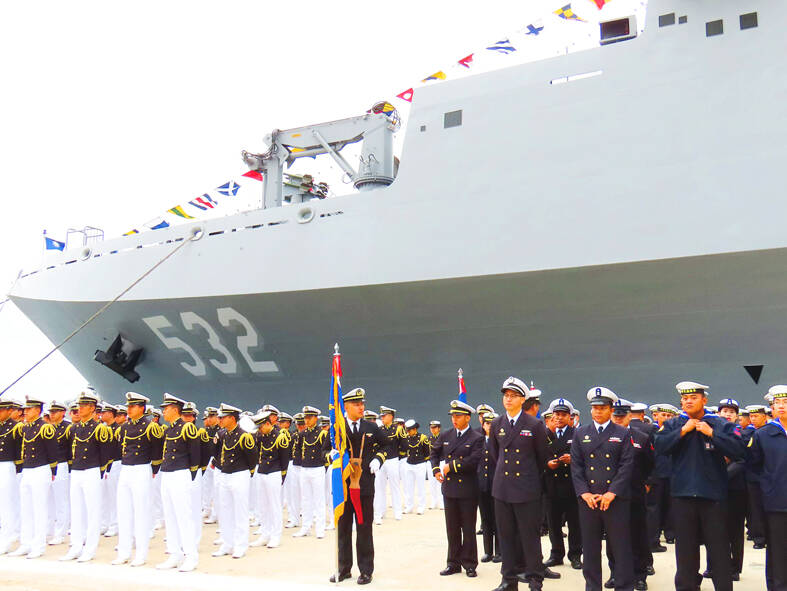Taiwan has signed three contracts with the US worth NT$10.69 billion (US$329 million) to procure spare parts for its air force and navy, the government said yesterday.
According to a notice on the Government e-Procurement System, the deal to procure “standard” and “nonstandard aviation parts and accessories” and “ship parts and accessories” was signed by the Ministry of National Defense’s Defense Mission to the US and the American Institute in Taiwan (AIT).
The notice said the contracts are valid from the day they were signed until the second half of 2026.

Photo: Liu Yu-ching, Taipei Times
The equipment included in the purchase would be used by the air force and navy at facilities in Pingtung, Kaohsiung and Tainan, the notice said.
In other news, the National Audit Office’s report for the first half of the year showed that of the ministry’s 238 projects planned for this year, 62 had not received funding and 49 funded projects had not yet reached 90 percent implementation.
According to the office’s report, the ministry projects had a total budget of NT$136.50 billion and could allocate NT$7.33 billion, or 5.38 percent of its budget, to 62 projects.
The 49 projects funded that have not reached a 90 percent completion rate, which include the purchase of new tanks, were given NT$16.45 billion, or 12.06 percent of the year’s total, the report said.
The ministry had six months to act on its budget, and little progress was made on projects waiting for funding and ongoing projects, the agency said.
The agency said it had notified the ministry to make budget plans and review why budget implementation has been behind schedule.
In response, the ministry said it planned to fund its projects in the second half of the year.
The ministry said it had ordered its units to step up oversight and project management to realize a 90 percent completion rate.
Through budget reallocation and project reviews, it aims to reduce the risk of projects falling behind schedule, the ministry said.

INVESTIGATION: The case is the latest instance of a DPP figure being implicated in an espionage network accused of allegedly leaking information to Chinese intelligence Democratic Progressive Party (DPP) member Ho Jen-chieh (何仁傑) was detained and held incommunicado yesterday on suspicion of spying for China during his tenure as assistant to then-minister of foreign affairs Joseph Wu (吳釗燮). The Taipei District Prosecutors’ Office said Ho was implicated during its investigation into alleged spying activities by former Presidential Office consultant Wu Shang-yu (吳尚雨). Prosecutors said there is reason to believe Ho breached the National Security Act (國家安全法) by leaking classified Ministry of Foreign Affairs information to Chinese intelligence. Following interrogation, prosecutors petitioned the Taipei District Court to detain Ho, citing concerns over potential collusion or tampering of evidence. The

‘FORM OF PROTEST’: The German Institute Taipei said it was ‘shocked’ to see Nazi symbolism used in connection with political aims as it condemned the incident Sung Chien-liang (宋建樑), who led efforts to recall Democratic Progressive Party (DPP) Legislator Lee Kun-cheng (李坤城), was released on bail of NT$80,000 yesterday amid an outcry over a Nazi armband he wore to questioning the night before. Sung arrived at the New Taipei City District Prosecutors’ Office for questioning in a recall petition forgery case on Tuesday night wearing a red armband bearing a swastika, carrying a copy of Adolf Hitler’s Mein Kampf and giving a Nazi salute. Sung left the building at 1:15am without the armband and apparently covering the book with a coat. This is a serious international scandal and Chinese

Seventy percent of middle and elementary schools now conduct English classes entirely in English, the Ministry of Education said, as it encourages schools nationwide to adopt this practice Minister of Education (MOE) Cheng Ying-yao (鄭英耀) is scheduled to present a report on the government’s bilingual education policy to the Legislative Yuan’s Education and Culture Committee today. The report would outline strategies aimed at expanding access to education, reducing regional disparities and improving talent cultivation. Implementation of bilingual education policies has varied across local governments, occasionally drawing public criticism. For example, some schools have required teachers of non-English subjects to pass English proficiency

TRADE: The premier pledged safeguards on ‘Made in Taiwan’ labeling, anti-dumping measures and stricter export controls to strengthen its position in trade talks Products labeled “made in Taiwan” must be genuinely made in Taiwan, Premier Cho Jung-tai (卓榮泰) said yesterday, vowing to enforce strict safeguards against “origin laundering” and initiate anti-dumping investigations to prevent China dumping its products in Taiwan. Cho made the remarks in a discussion session with representatives from industries in Kaohsiung. In response to the US government’s recent announcement of “reciprocal” tariffs on its trading partners, President William Lai (賴清德) and Cho last week began a series of consultations with industry leaders nationwide to gather feedback and address concerns. Taiwanese and US officials held a videoconference on Friday evening to discuss the